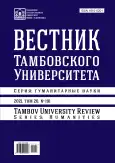Developing translation competence in economics major students as a part of the foreign language course
- 作者: Stepanova M.M.1, Lukyanova V.S.1
-
隶属关系:
- Moscow State Institute of International Relations (University) of the Ministry of Foreign Affairs of the Russian Federation
- 期: 卷 26, 编号 191 (2021)
- 页面: 38-48
- 栏目: THEORY AND METHODS OF FOREIGN LANGUAGE TEACHING
- URL: https://journal-vniispk.ru/1810-0201/article/view/298356
- DOI: https://doi.org/10.20310/1810-0201-2021-26-191-38-48
- ID: 298356
如何引用文章
全文:
详细
This study examines translation competence building in university students majoring in economics. The research question is the translation competence of the economist. It is shown that competence should be developed through university education since translation skills are one of the key prerequisites for a successful career in the international economy. Written translation and sight translation are identified as the most relevant kinds of translation for the economist. The fundamentals of developing the translation competence in the economics students as part of the language for specific purposes course and the applications of key learning principles at Moscow State Institute of International Relations of the Ministry of Foreign Affairs of Russian Federation (Odintsovo Branch) are analyzed. The value of such learning principles as scientific approach, awareness, consistency, availability, and visualization is emphasized; it covers the skills and abilities relevant for both translators and economists. The following areas of curriculum development and teaching that meet today’s challenges are analyzed: teaching aids selection and systematization; offline and online interaction with the students; curriculum and administrative support for the educators. The conclusions are as follows: the key requirement is making the translation course contents match the foreign language course; the focus is on studying the specialized terminology and building the information/terminology search skills in native and foreign languages. Another focus area is promoting the student learning activities, their motivation and intrinsic readiness to perform specialized translation.
作者简介
M. Stepanova
Moscow State Institute of International Relations (University) of the Ministry of Foreign Affairs of the Russian Federation
Email: m.stepanova@odin.mgimo.ru
ORCID iD: 0000-0003-0444-8155
Candidate of Pedagogy, Associate Professor of English Language Department
76 Vernadskogo Ave., Moscow 119454, Russian FederationV. Lukyanova
Moscow State Institute of International Relations (University) of the Ministry of Foreign Affairs of the Russian Federation
编辑信件的主要联系方式.
Email: v.lukyanova@odin.mgimo.ru
ORCID iD: 0000-0002-7532-8663
Candidate of Philology, Associate Professor of English Language Department
76 Vernadskogo Ave., Moscow 119454, Russian Federation参考
- Sim M.A., Pop A.M. Managing the translation of economic texts. Annals of Faculty of Economics, University of Oradea, Faculty of Economics, 2012, vol. 1 (2), pp. 152-157.
- Meshcheryakova E.V., Loktyushina E.A., Kakicheva Y.V. Osobennosti formirovaniya perevodcheskoy kompe-tentsii kak chasti professional’noy podgotovki [Special features of translation competence development as pro-fessional training]. Sovremennyye problemy nauki i obrazovaniya – Modern Problems of Science and Education, 2013, no. 3. (In Russian). Available at: http://www.science-education.ru/ru/article/ view?id=9245 (accessed 05.12.2020).
- Kostyukova T.A., Morozova A.L. Pedagogicheskiye osnovy razvitiya inoyazychnoy kommunikativnoy kompetentsii studentov neyazykovykh napravleniy podgotovki [Pedagogical foundations of the development of foreign language communicative competence of students of non-linguistic areas of training]. Yazyk i kul’tura – Language and Culture, 2019, no. 46, pp. 216-235. (In Russian).
- Latyshev L.K. Perevod: teoriya, praktika i metodika prepodavaniya [Translation: Theory, Practice and Teaching Methods]. Moscow, Akademiya Publ., 2003, 192 p. (In Russian).
- Gavrilenko N.N. Rol’ perevoda v protsesse podgotovki spetsialistov neyazykovogo profilya [The role of transla-tion in the training of non-linguistic specialists]. Vestnik MGLU – Vestnik of Moscow State Linguistic University, 2013, no. 12 (672), pp. 153-161. (In Russian).
- Kotlyarova Y.P. Perevodcheskaya kompetentsiya kak mnogoaspektnoye teoreticheskoye ponyatiye [Trans-lation competence as a multifaceted theoretical concept]. Vestnik Kostromskogo gosudarstvennogo universiteta. Seriya: Pedagogika. Psikhologiya. Sotsiokinetika – Vestnik of Kostroma State University. Series: Pedagogy. Psychology. Sociokinetics, 2007, vol. 13, no. 3, pp. 55-59. (In Russian).
- Krasavina O.I., Vetrova O.G. Dvukhurovnevoye formirovaniye perevodcheskoy kompetentsii studentov tekhni-cheskogo vuza [The two-level formation of translation competence of technical university students]. Nauchno-tekhnicheskiye vedomosti Sankt-Peterburgskogo gosudarstvennogo politekhnicheskogo universiteta. Obshchestvo. Kommunikatsiya. Obrazovaniye – St. Petersburg State Polytechnical University Journal. Humanities and Social Sciences, 2014, no 1 (191), pp. 28-35. (In Russian).
- Belkova E.V. Abzatsno-frazovyy perevod v strukture professional’noy perevodcheskoy kompetentnosti ekono-mista [Paragraph-phrase translation in the structure of professional translation competence of an economist]. Vestnik Yuzhno-Ural’skogo gosudarstvennogo gumanitarno-pedagogicheskogo universiteta – The Herald of South-Ural State Humanities-Pedagogical University, 2008, no. 6, pp. 3-13. (In Russian).
- Gavrilenko N.N. Mezhdistsiplinarnyy podkhod k obucheniyu otraslevomu perevodu [Interdisciplinary approach to teaching industry-specific translation]. Voprosy metodiki prepodavaniya v vuze – Teaching Methodology in Higher Education, 2019, vol. 8, no. 29, pp. 12-23. (In Russian).
- Hu Wan, Wang Xuquan. Balancing university teaching and media industry needs: a case study of teaching finance and economics news translation. International Journal of Higher Education, 2019, vol. 8, no. 3, pp. 247-256.
- Li D. News Translation: Principles and Methods. Hong Kong, Hong Kong University Press, 2017.
- Pichkova L.S., Bochkova Y.L., Maslina I.N., Pantyukhina L.V. Ekonomicheskiy angliyskiy – perevod i referiro-vaniye – teoriya i praktika [Economic English – Translation and Abstracting – Theory and Practice]. Moscow, Moscow State Institute of International Relations (University) of the Ministry of Foreign Affairs of the Russian Federation Publ., 2015, 525 p. (In Russian).
- Kozulyayev A.V. Obucheniye studentov audiovizual’nomu perevodu v epokhu kognitivnoy revolyutsii: k post-anovke problemy [Teaching audiovisual translation to digital natives at the time of the cognitive revolution]. Voprosy metodiki prepodavaniya v vuze – Teaching Methodology in Higher Education, 2019, vol. 8, no. 29, pp. 48-56. (In Russian).
- Falco G. Translation of economic and financial texts through comics. TranscUlturAl, 2016, vol. 8-2, pp. 105-127.
补充文件








